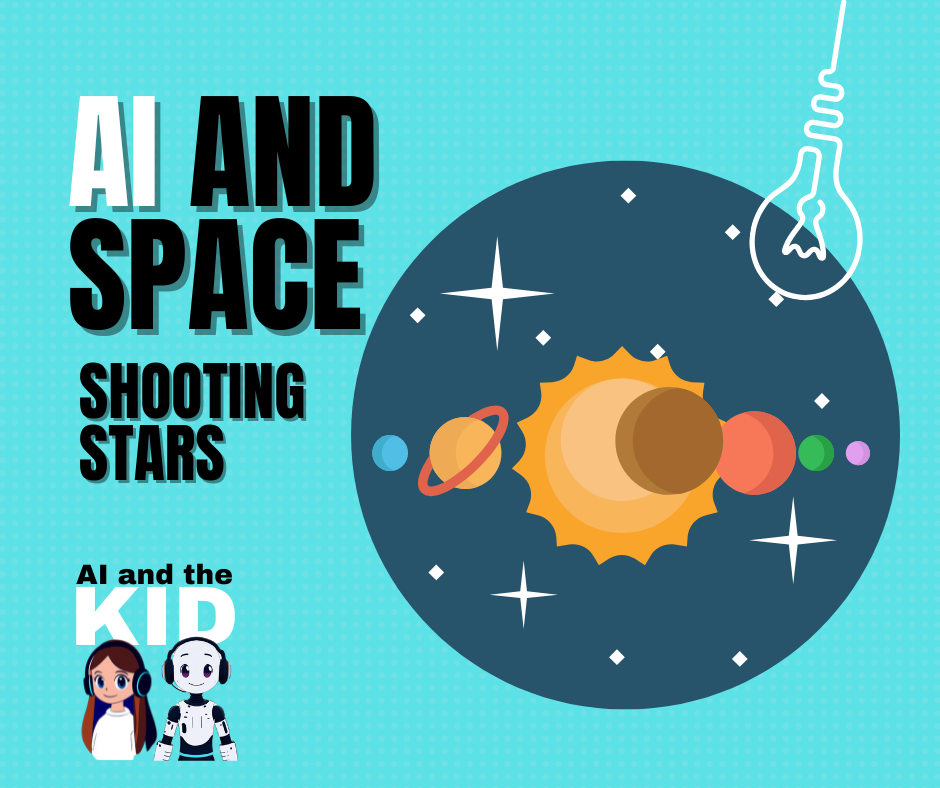Hello Creators of Tomorrow!
Have you ever wondered how astronauts get help when they’re floating miles above Earth? It turns out, AI is a big part of space exploration!
In this week’s episode of AI and the Kid, Emily and Alex discussed how AI helps astronauts on the International Space Station (ISS), assists in space navigation, and even discovers new planets!
Listen to the Podcast!
Find AI and the Kid wherever you listen to podcasts.
What We Explored in This Episode 🔎
How AI helps astronauts in space (like playing music and assisting with experiments!).
What AI navigation systems do and why they’re different from GPS.
How space agencies like NASA use AI to explore the universe.
Meet Cimon: The Floating AI Assistant 🤖
Astronauts on the ISS have an AI-powered helper called CIMON (Crew Interactive MObile companioN). Simon is a floating robot that moves using fans and can:
🎵 Play music for astronauts.
🎥 Record videos to send back to Earth.
💡 Help astronauts follow instructions for experiments.
It’s like having a little AI buddy in space! Here is a video of Cimon from 6 years ago. Cimon has since returned to earth.
How Does AI Help in Space?
AI plays a huge role in space missions. Here’s how:
🚀 Navigation – AI helps spacecraft and satellites adjust their paths and avoid obstacles in space.
🔍 Rover Exploration – AI helps the Perseverance rover find the safest paths on Mars.
🌎 Satellite Monitoring – AI helps track climate changes, wildfires, and other events on Earth.
🔭 Space Telescopes – AI helps analyze data from telescopes, finding distant galaxies and exoplanets faster.
Pretty cool, right? AI helps us explore space even when humans aren’t there!
Beyond the Podcast: Try This at Home! 🏡
These activities help you think like an AI scientist and explore space right from home! 🚀✨
🚀 Experiment 1: Design Your Own AI Space Robot
🔹 Step 1: Grab some paper and pencils and sketch your space robot.
🔹 Step 2: Think about its mission—what will your robot do to help astronauts? Will it repair the spaceship, analyze space rocks, cook space meals, or help astronauts exercise in zero gravity?
🔹 Step 3: Give your robot a name! The ISS robot Cimon stands for Crew Interactive MObile companioN. Come up with an acronym that describes what your robot does! (Example: NOVA – Navigation and Observation Virtual Assistant).
🔹 Step 4: List 3-5 special features of your robot. Does it float like Cimon or walk like a rover? Can it talk to astronauts or scan objects with a laser?
🔹 Bonus Challenge: Share your design with a friend or family member and explain how your robot would make space missions easier!
This activity helps you think like a NASA engineer designing the next AI helper for astronauts! 🚀✨
🔭 Experiment 2: Star Map Exploration
AI helps scientists explore deep space, but you can start right from your backyard!
1️⃣ Download a free stargazing app like SkyView, Star Walk, or NASA’s Eyes on the Sky.
2️⃣ Go outside at night and point your phone or tablet at the sky. See if you can find planets, constellations, or even the ISS!
3️⃣ Challenge yourself to learn the names of at least 3 constellations.
4️⃣ Think like an AI scientist! How do you think AI helps scientists detect exoplanets or black holes when we can’t see them?
🌠 Experiment 3: AI vs. Human Navigation Challenge
AI navigation systems help spacecraft find their way without human control. Try this experiment to compare your navigation skills to AI!
🔹 What You Need: A blindfold and a partner.
🔹 Step 1: One person is the "astronaut" and wears the blindfold. The other is "Mission Control."
🔹 Step 2: Mission Control must guide the astronaut safely across a room (or an obstacle course) using only voice instructions.
🔹 Step 3: Switch roles! Was it easy or hard to navigate without seeing?
🔹 Bonus: Imagine if you were in space, and signals from Earth were delayed—how would AI help make faster decisions?
🛰 Experiment 4: DIY AI Space Exploration Game
Pretend you are an AI helping NASA explore a new planet!
1️⃣ Grab a piece of paper and draw a planet.
2️⃣ Mark obstacles like mountains, craters, or rivers that a Mars rover might encounter.
3️⃣ Give yourself a mission! (Example: "Find ice on Planet Zeta.")
4️⃣ Try navigating your planet using logic like AI. Move step by step, avoiding obstacles, and making decisions based on what’s around you.
5️⃣ Bonus: Have a friend create a planet for you and see if your AI can "explore" it successfully!
🤖 Explore More with Gear
Want to discuss the episode more? Try out our custom chatbot, Gear. Gear can answer all your questions or help you explore the topics from this episode more.
Be Part of the Podcast! 🎙️
Have a question about AI or space? Email us at aikidmedia@gmail.com—your question might be featured in an upcoming episode!
🚀 Be creative, learn, and keep discovering—because you are the creators of tomorrow!
This newsletter was written in collaboration with AI. The main image was created in Canva by a human.






Interesting